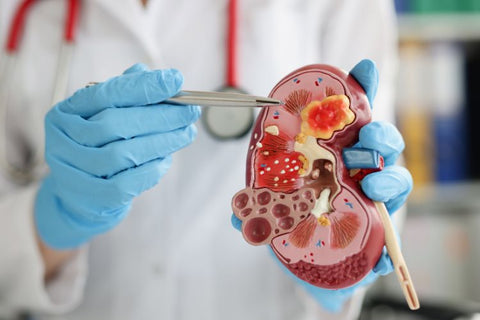Can plant-based protein powder cause bloating?
Are you considering incorporating plant-based protein powders into your diet? Before you do, it's crucial to understand the potential causes of bloating associated with their consumption. In this article, we'll delve into the factors that can contribute to bloating when consuming plant-based protein powders and explore solutions to mitigate discomfort. From fiber content to individual variability, we'll cover everything you need to know to make informed choices about your protein supplementation. Let's dive in and uncover the intricacies of bloating with plant-based protein powders.
Fiber Content: Friend or Foe?
Plant-based protein powders are a popular choice for those following vegan, vegetarian, or lactose-intolerant diets. A key advantage of these powders is their inherent fiber content, often exceeding that of whey protein. Here are some key benefits:
- Enhanced Gut Microbiome: Dietary fiber serves as a prebiotic substrate, selectively nourishing beneficial bacterial populations within the gastrointestinal tract. These bacteria ferment fiber, generating short-chain fatty acids that contribute to gut barrier integrity and overall digestive health. This translates to improved stool consistency, reduced risk of constipation, and a potentially stronger defense against pathogenic bacteria.
- Prolonged Satiety: Fiber possesses the well-documented ability to promote satiety and feelings of fullness. This effect arises from fiber's capacity to delay gastric emptying, thereby extending the period of satiety following protein powder consumption. This characteristic can be particularly advantageous for weight management efforts by curbing cravings and potentially reducing overall caloric intake.
- Modulated Blood Sugar Response: Dietary fiber plays a role in regulating blood sugar levels by hindering the intestinal absorption of glucose. This controlled absorption is especially important for individuals with diabetes or prediabetes, as it helps to maintain glycemic balance.
- Favorable Cholesterol Profile: Soluble fiber, a specific type present in some plant-based protein powders, has been linked to reductions in LDL ("bad") cholesterol levels. Soluble fiber binds to cholesterol in the digestive tract, facilitating its excretion from the body. This mechanism may contribute to a healthier cardiovascular risk profile.
Intolerance to Specific Ingredients
Plant-based protein powders, while offering a healthy alternative for some, can trigger bloating in individuals with intolerances or sensitivities to certain ingredients. Here's how some common ingredients might be culprits:
1. Soy Protein:
- Intolerance: Soybeans contain oligosaccharides, complex sugars that our bodies struggle to digest completely. In individuals with soy intolerance, these undigested sugars reach the large intestine where gut bacteria ferment them, producing gas and leading to bloating.
- Allergy: Soy allergies are less common than intolerances but can also cause bloating. In this case, the immune system overreacts to soy proteins, triggering digestive issues like bloating alongside other potential symptoms such as nausea, vomiting, or hives.
2. Fiber:
- Excessive Intake: While fiber in plant-based protein powders offers benefits, consuming too much too quickly can overwhelm your gut bacteria, leading to excessive gas production and bloating, especially for those not accustomed to high-fiber diets.
3. Thickeners and Gums:
- Sensitivity: Some protein powders contain thickeners like xanthan gum or guar gum to improve texture and mixability. While generally safe, some individuals might have sensitivities to these thickeners, experiencing bloating and digestive discomfort even in small amounts.
4. Sugar Alcohols:
- Incomplete Absorption: Sugar alcohols like xylitol or erythritol are often used as sweeteners in protein powders. These sugar alcohols are not fully absorbed by the body and can draw water into the intestines, leading to bloating and gas in some people.
The growing popularity of plant-based diets has led to a surge in plant-based protein powders. While convenient, these powders can trigger adverse reactions in individuals with intolerances to specific ingredients like soy or pea protein. This necessitates exploring alternative protein sources to ensure adequate protein intake without compromising digestive health.
Whole Food Strategies for Protein Acquisition
For those following a plant-based lifestyle, ensuring adequate protein intake can be a key concern. While protein powders offer a convenient solution, they may not be suitable for everyone, particularly those with intolerances to certain ingredients. Here are a few options to consider:
- Leguminous Vielfalt (Legume Variety): Legumes, encompassing beans, lentils, and chickpeas, offer a stellar source of plant-based protein and fiber. They are naturally gluten-free and typically void of soy or nuts unless pre-made dishes incorporate them. Explore a diverse range of legumes like black beans, kidney beans, chickpeas, and lentils to add variety to your diet and maximize nutrient intake.
- Quinoa: The Complete Protein Grain: This versatile grain stands out as a complete protein source, providing all nine essential amino acids the body cannot synthesize on its own. Additionally, quinoa is naturally gluten-free, making it a suitable option for individuals with celiac disease or gluten sensitivity. Enjoy its versatility by incorporating it into salads, bowls, or as a flavorful side dish.
- Seed Synergy: Pumpkin seeds, sunflower seeds, and hemp seeds are well-regarded sources of protein and healthy fats. These can be enjoyed as a standalone snack, sprinkled on salads for added texture and nutrition, or even incorporated into smoothies for a protein and fiber boost. However, if nut allergies are a concern, exercise caution with hemp seeds or other nut-based varieties.
- Tempeh: A Potentially Soy-Tolerable Option: A fermented soybean product, tempeh may offer some relief for those with mild soy intolerance. The fermentation process breaks down complex sugars within soybeans that can trigger digestive issues in sensitive individuals. Nevertheless, if you have a severe soy allergy, it's advisable to proceed with caution and consult a healthcare professional before consuming tempeh.
Alternative Plant-Based Protein Powders
Here are some alternatives that can work to prevent bloating:
- Brown Rice Protein: The Hypoallergenic Contender: Brown rice protein powder emerges as a hypoallergenic option, boasting easy digestibility and an absence of common allergens like soy and gluten. This makes it a compelling choice for individuals with multiple intolerances. However, it's important to note that brown rice protein may have a slightly lower protein content compared to some other options.
- Sprouted Grain Powders: A Promising Frontier: Powders derived from sprouted grains like buckwheat or mung bean are gaining traction in the health and wellness market. The sprouting process has been shown to enhance protein digestibility and nutrient absorption, potentially making them a suitable option for those with sensitivities. However, further research is required to definitively establish their long-term benefits and potential allergen profiles.
Lack of Enzymes for Digestion
Digestive enzymes play a crucial role in breaking down plant-based proteins into their constituent amino acids, which are the building blocks the body uses to build and repair tissues. Here's a breakdown of their specific functions:
Protease Enzymes
- These are the primary enzymes responsible for protein digestion. They break down large protein molecules into smaller chains of amino acids called peptides.
- Plant-based proteins often contain higher levels of certain antinutrients, like protease inhibitors, which can hinder protein digestion. Digestive enzymes can help counteract these inhibitors, allowing for more efficient protein breakdown.
Other Digestive Enzymes
While proteases handle the bulk of protein breakdown, other enzymes play supporting roles:
- Amylase: This enzyme helps digest carbohydrates, which can be present alongside protein in certain plant-based foods.
- Lipase: This enzyme breaks down fats, which may also be present in some plant-based protein sources.
- Cellulase: This enzyme helps break down cellulose, a type of fiber found in plant cell walls. While not directly involved in protein digestion, cellulase can improve overall nutrient absorption from plant-based foods.
Enzyme deficiencies can contribute to bloating. Our digestive system relies on enzymes to break down food molecules into smaller, absorbable units. When we have a deficiency in one or more enzymes, this breakdown process falters.
Undigested food molecules then reach the large intestine, where gut bacteria ferment them. This fermentation process produces gas as a byproduct, which can cause bloating, gas, and abdominal discomfort.
Here's a breakdown of how enzyme deficiency can lead to bloating:
- Deficient enzyme: Your body lacks a specific enzyme needed to break down a particular food component (e.g., lactose in dairy products).
- Undigested food: The food component reaches the large intestine undigested.
- Bacterial fermentation: Gut bacteria ferment the undigested food, producing gas.
- Bloating: The gas buildup in the intestines stretches the intestinal walls, causing bloating and discomfort.
Some common enzyme deficiencies that can contribute to bloating include:
- Lactose intolerance: This is caused by a lactase deficiency, the enzyme needed to break down lactose, the sugar found in milk and dairy products.
- Sucrase-isomaltase deficiency: This deficiency impairs the digestion of sucrose (table sugar) and isomaltose (a sugar found in some starches).
- Celiac disease: This autoimmune disorder triggers an immune response to gluten, a protein found in wheat, barley, and rye. The resulting inflammation can damage the small intestine and impair enzyme production.
- Pancreatic insufficiency: This condition occurs when the pancreas doesn't produce enough digestive enzymes, leading to malabsorption of various nutrients.
Gas Production during Digestion
Plant-based proteins themselves aren't the main culprit behind gas production, but rather the companions they come with fiber and certain complex carbohydrates. Here's the breakdown:
- High fiber content: Many plant-based protein sources like beans, lentils, peas, and some whole grains are packed with fiber. While fiber is essential for gut health, our bodies can't fully digest it. In the large intestine, gut bacteria ferment this undigested fiber, producing gas as a byproduct. This gas can cause bloating, discomfort, and flatulence.
- Certain complex carbohydrates: Some plant proteins, like beans and certain legumes, contain complex sugars like raffinose and stachyose. These sugars are difficult for our digestive enzymes to break down in the small intestine. Similar to fiber, they reach the large intestine where bacteria ferment them, again creating gas.
However, there are ways to mitigate this gassy effect of plant-based proteins:
- Gradual introduction: If you're new to a high-fiber diet, introduce these protein sources gradually to allow your gut bacteria to adapt and adjust to the increased fiber intake.
- Soaking and rinsing: Soaking and rinsing beans, lentils, and peas can help reduce their oligosaccharide content (those complex sugars we mentioned) which can contribute to gas.
- Cooking methods: Pressure cooking can help soften the fiber in beans and legumes, making them easier to digest and potentially reducing gas production.
- Consider protein powders: Unlike whole plant-based protein sources, protein powders often have most of the fiber and starches removed, making them easier to digest and less likely to cause gas.
High FODMAP Content
FODMAP stands for Fermentable Oligosaccharides, Disaccharides, Monosaccharides And Polyols. These are short-chain carbohydrates that some people have trouble digesting. When they reach the large intestine, gut bacteria ferment them, which can cause digestive issues like bloating, gas, pain, diarrhea, and constipation.
People with irritable bowel syndrome (IBS) are particularly sensitive to FODMAPS. A low FODMAP diet can be very effective in reducing these digestive symptoms.
FODMAPs in Plant-Based Protein Sources
Here's a breakdown of FODMAP content in some common plant-based protein sources:
- High FODMAP: Beans (except green beans), lentils, chickpeas, peas, some nuts (pistachios, cashews), certain grains (wheat, rye, barley)
- Moderate FODMAP: Tofu (depending on processing), some seeds (sunflower, pumpkin)
- Low FODMAP: Tempeh, certain nuts (almonds, macadamia), seeds (chia, flax), rice protein powder, pea protein powder (isolate only)
Low FODMAP Protein Alternatives
If you're looking for low FODMAP alternatives to high FODMAP plant proteins, here are some options:
- Tempeh: This fermented soybean product is a good source of protein and is lower in FODMAPs than regular tofu.
- Rice Protein Powder: Rice protein powder is generally well-tolerated and a good source of complete protein.
- Pea Protein Isolate: Look for pea protein isolate powders, which have most of the FODMAPs removed during processing. Regular pea protein powder can be high in FODMAPs.
- Nuts and Seeds: Certain nuts and seeds like almonds, macadamia nuts, chia seeds, and flax seeds are low in FODMAPs and provide a good amount of protein.
Incomplete Digestion
Our digestive system relies on a well-coordinated team of players: enzymes, stomach acid, and muscle contractions to break down food into smaller components for absorption. When this process falters due to various reasons, incomplete digestion occurs. Here's how it leads to colonic fermentation:
- Undigested food reaches the colon: When food isn't fully broken down in the small intestine, larger particles reach the large intestine (colon) instead of being absorbed.
- Gut bacteria take over: The colon is home to trillions of bacteria, constantly fermenting any available food sources.
- Fermentation byproducts: These bacteria break down these undigested food molecules, primarily complex carbohydrates and fibers, producing gas (hydrogen, methane, carbon dioxide) as a byproduct. This gas buildup leads to bloating, discomfort, and flatulence.
Strategies to Improve Digestion and Reduce Bloating
Here are some strategies to improve digestion and reduce bloating caused by incomplete digestion:
- Identify food sensitivities: Certain foods like dairy (lactose intolerance), gluten (celiac disease), or specific FODMAPs can be difficult to digest and contribute to bloating. Identifying and limiting these triggers can significantly improve digestion.
- Eat smaller meals: Smaller, more frequent meals are easier for your digestive system to handle compared to overloading it with a large volume of food at once.
- Chew thoroughly: Proper chewing breaks down food mechanically, making it easier for stomach acid and enzymes to work their magic. This reduces the workload on the small intestine and minimizes undigested food reaching the colon.
- Stay hydrated: Drinking plenty of water helps break down food, eases passage through the digestive tract, and prevents constipation, a potential contributor to bloating.
- Consider digestive aids: Certain enzymes like lactase (for lactose intolerance) or alpha-galactosidase (for specific bean sugars) can be taken before meals to aid the digestion of specific problem foods. However, it’s important to consult a doctor before taking any supplements.
- Manage stress: Stress can disrupt digestive processes. Relaxation techniques like deep breathing or meditation can be helpful.
- Probiotics: These supplements containing live bacteria can help maintain a healthy gut microbiome, potentially improving digestion and reducing bloating. However, research is ongoing in this area, and consulting a doctor is recommended before starting probiotics.
Hydration Levels
Water is crucial for digestion in several ways, acting like a lubricant and transport vehicle throughout the process. Here's how hydration keeps your digestion running smoothly:
- Aiding Breakdown: Digestion starts in the mouth, where saliva containing digestive enzymes begins to break down food, particularly carbohydrates. Water is a major component of saliva, making it the medium for these enzymes to function effectively.
- Softening Food: As food travels down the esophagus and into the stomach, water helps soften it. This makes it easier for the stomach muscles to churn and break down food particles further.
- Dissolving Digestive Juices: The stomach relies on powerful digestive juices containing enzymes and acids to break down proteins. Water helps dissolve these juices, ensuring they're evenly distributed throughout the food mass for efficient digestion.
- Facilitating Nutrient Absorption: Once food is broken down into smaller molecules in the small intestine, water plays a vital role in absorption. Nutrients are transported from the intestine into the bloodstream through watery solutions. Proper hydration ensures these essential nutrients can be efficiently absorbed and delivered throughout your body.
- Preventing Constipation: Fiber is essential for gut health, but it also needs water to function properly. When you're dehydrated, stool can become hard and difficult to pass, leading to constipation. Adequate water intake keeps stools soft and promotes regular bowel movements.
Dehydration can disrupt this delicate balance, leading to various digestive issues like:
- Heartburn and Indigestion: Dehydration can thicken stomach acid, increasing the risk of heartburn and indigestion.
- Constipation: As mentioned earlier, lack of water can make stool hard and difficult to pass.
- Bloating: Dehydration can also contribute to bloating, as the digestive system struggles to move food through efficiently.
Here are some tips to stay hydrated and support healthy digestion:
- Drink plenty of water throughout the day. Aim for eight glasses, but adjust based on your activity level and climate.
- Include water-rich foods: Fruits and vegetables like watermelon, cucumber, celery, and leafy greens are all excellent sources of water and fiber.
- Pay attention to your urine color: Pale yellow urine is a good indicator of hydration. Darker-colored urine suggests dehydration.
- Listen to your thirst: Don't wait until you're thirsty to drink water. Thirst is already a sign of slight dehydration.
Conclusion
In conclusion, while plant-based protein powders offer numerous benefits such as enhanced gut health and sustainable protein sources, they can also contribute to bloating in some individuals. Factors such as high fiber content, intolerance to specific ingredients, lack of digestive enzymes, gas production during digestion, and high FODMAP content can all play a role in this discomfort. To mitigate bloating, individuals can explore alternative protein sources, gradually introduce high-fiber foods, stay hydrated, and consider digestive aids if necessary. By understanding the potential causes of bloating and implementing appropriate strategies, individuals can enjoy the benefits of plant-based protein powders while minimizing digestive discomfort.
Key Takeaways
- Plant-based protein powders may cause bloating due to factors like high fiber content, intolerance to certain ingredients, lack of digestive enzymes, and gas production during digestion.
- To reduce bloating, consider alternatives with lower fiber, avoid intolerant ingredients, ensure sufficient enzymes for digestion, introduce high-fiber foods gradually, manage hydration, and opt for low FODMAP options if necessary.
- Consulting a healthcare professional can offer personalized advice for managing bloating and improving digestive health.





